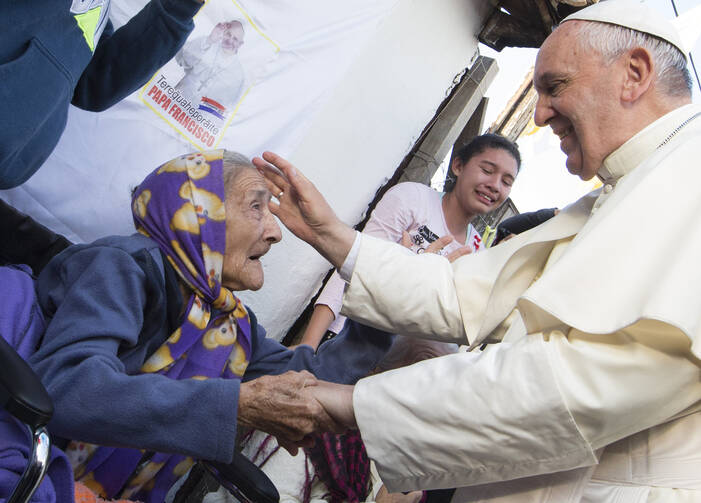This is a feature in the special commemorative issue of America celebrating Pope Francis and his five groundbreaking years. Purchase a copy of Pope Francis: Five Groundbreaking Years here.
In his first meeting with the press on March 16, 2013, Pope Francis told journalists, “How I would like a church which is poor and for the poor!”
Since becoming pope, he has never ceased to look for ways to make that wish come true, starting with what he calls “the conversion of the papacy.” He began on the night of his election in the Sistine Chapel’s “Room of Tears” by refusing to accept the ermine-trimmed red velvet mozzetta, gold pectoral cross and red shoes prepared for the new pope, opting instead to keep his simple silver cross and well-worn black shoes.
This came as a surprise to many, starting with the cardinals who had just elected him. They did not know that as a bishop in Argentina he dressed as a simple priest, wearing a black suit but never the chain and cross under the jacket (with the former visible and the latter hidden), as many prelates do to show their rank. When John Paul II named him cardinal, he did not buy new robes; instead, he asked to have his predecessor’s garments reworked to fit him.
He surprised the electors, too, when immediately after greeting the people in St. Peter’s Square for the first time as pope, he rejected the limousine that was waiting to take him back to his residence and opted instead to ride with the cardinals in a bus. The following morning, he asked to be driven to the Basilica of St. Mary Major in a small economy car, not in one of the bullet-proof Mercedes-Benz limousines that were ready for his use. Ever since, he has used a small economy car, even on foreign trips, as we saw in the United States.
Across the globe, the rich and people in positions of power emphasize their status by using luxury brand cars. Francis has always refused such status symbols. On becoming archbishop of Buenos Aires in 1998, he sold the big car that his predecessor used and found a new job for the chauffeur. As pope, he has frequently railed against clergy or religious who drive in the latest model cars, denouncing it as “a scandal” and an offense to the poor.
Soon after his election, he announced his decision not to live in the Apostolic Palace as his predecessors had done since the 17th century but to remain instead at Casa Santa Marta, where he lives in three rooms: a living room, a small study and a small bedroom.
His decision shocked many in the Vatican but not those who knew he had done likewise in Buenos Aires, where there was a large official residence for the archbishop at Olivos, near that of the country’s president. As archbishop, however, Jorge Bergoglio never lived there, not even for one day. Instead, he lived in the diocesan curia near the cathedral, in a small study and bedroom.
Likewise, Francis has not spent a single night in the papal summer residence at Castel Gandolfo, where most of his predecessors since Clement VIII (1592-1605), who bought the property, had taken refuge from the Roman heat in the summer months. “The poor do not live in palaces,” he told a person close to him during his first summer in Rome. Last October, the Vatican announced his decision to open the summer residence to the public, who can now visit it all year round.
Francis clearly would like cardinals, bishops and priests to use small cars and live in modest residences. He is seeking to inspire them by example, and an increasing, though still small number are following suit. Many, however, are resistant to this and several say: “He is a Jesuit. He has taken a vow of poverty, but I have not.” But for Francis, it is a question of coherence to the Gospel message and the option for the poor.
“The riches of the church are meant for the service of the poor,” he has stated several times. He wants those administering the Vatican and local church finances to bear this in mind and not to misuse or waste them. In Rome, he has given a broad mandate to the papal almoner, the Polish archbishop Konrad Krajewski, to use Vatican resources for the poor. He has asked religious orders to review their use of the properties they own. In all this, he is challenging church leaders in a big way.








